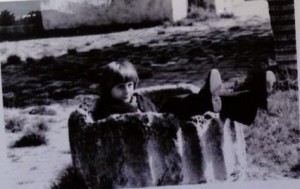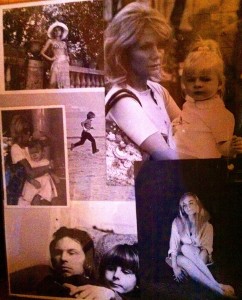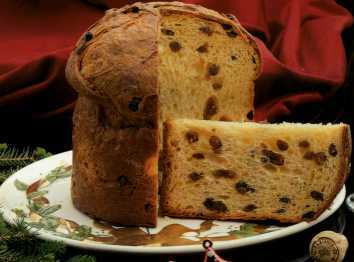Mumps, pancreatitis, mayhem.
This is what I remember.
My parents fighting. My sister and I hiding, crouched at the top of the stairs, watching my father chasing after my mother downstairs, she screaming at him. Words children should never hear. Most of all, an energy children shouldn’t experience from their parents. An energy of tension and fear, spewed in the other’s face through the fangs of hatred. Or, maybe, just something that’s better not to be experienced by children like the child I was.
My sister and I glance at each other. A fear and pain so deep, like a snare clenching my stomach, solar plexus and pancreas all in a ball, turning it into a pulp and yanking it out of my body.
 I got mumps. My bed broke. I’m sure this has absolutely no importance in the grand scheme of things, but, for some reason, its image is hatched in my memory. The mattress was on the floor, surrounded by the bed frame, in the middle of the room. From the floor level, where I spent days on the mattress fighting the virus and its fever, my room felt bigger, and I felt lonelier. I liked when my mother came by to apply a black paste behind my ears. It was supposed to help decrease the inflammation. She and my dad were worried and that distracted them from the tension and anger toward each other. I liked my mother’s attention. Not that she didn’t pay attention to me. But in those moments her attention was free, without requests, I didn’t have to do anything. I just had to be there. On my broken bed, in the middle of the room.
I got mumps. My bed broke. I’m sure this has absolutely no importance in the grand scheme of things, but, for some reason, its image is hatched in my memory. The mattress was on the floor, surrounded by the bed frame, in the middle of the room. From the floor level, where I spent days on the mattress fighting the virus and its fever, my room felt bigger, and I felt lonelier. I liked when my mother came by to apply a black paste behind my ears. It was supposed to help decrease the inflammation. She and my dad were worried and that distracted them from the tension and anger toward each other. I liked my mother’s attention. Not that she didn’t pay attention to me. But in those moments her attention was free, without requests, I didn’t have to do anything. I just had to be there. On my broken bed, in the middle of the room.
 Then they left. They went on a vacation, I guess to try to reconcile their differences. But, Acapulco fell way short compared to the work a solid therapist could’ve done for both of them. My sister and I stayed with my grandparents. Upon their return, my grandma said to my parents, “Chicco pees a lot. I mean, a lot.” (Chicco was my childhood nickname, it’s pronounced Kee-kko.)
Then they left. They went on a vacation, I guess to try to reconcile their differences. But, Acapulco fell way short compared to the work a solid therapist could’ve done for both of them. My sister and I stayed with my grandparents. Upon their return, my grandma said to my parents, “Chicco pees a lot. I mean, a lot.” (Chicco was my childhood nickname, it’s pronounced Kee-kko.)
Next thing I remember, I’m in a hospital bed in Imola, Italy. I’m diagnosed with pancreatitis. My father commutes back and forth between Rimini and Imola, to work and be close to me. My mother is worried and she is always with me. What Acapulco couldn’t do, my pancreatitis seemed to have accomplished in an instant. It wiped out their tension and differences to a blank slate.
And then I was diagnosed with Diabetes Mellitus (as it was referred to then.) I was seven years old and obviously had no idea what it was. They told me, “It’s a disease that will be with you… for the rest of your life.” And I thought, “Okay.” And that’s really all I thought.
I wasn’t worried, because I was focused on this miracle that was happening in front of my eyes, in the little hospital room in Imola. My mother and father were together, around my bed, and there was no fighting. It actually felt they were supporting each other, for an instant. And that made me happy.
But it lasted an instant, because then what I saw in my mother’s and father’s eyes was a film of tremendous yet muted pain, loss, a sense of failure and desperation that I didn’t know how to describe back then. It was mayhem, like an atomic bomb that exploded inside each one of them with the volume on mute. The only thing I could compare it to was that snare that grabbed my solar plexus when I heard them fight. And I immediately felt responsible for their pain.
Back then type 1 diabetes was considered similar to a 30-40 year death sentence. Instead of a new lease of life, it was like a life mortgage. You were given 4 decades of life, that you had to pay back as time went by, payments getting steeper and steeper, until your system failed and you gave your life back. Now we know this is not true, at all. With the right awareness and management, one can live a long and healthy life, like anyone else. But this wasn’t the case then, and my parents looked like I had been given a death sentence.
Yet, they managed to be absolutely great with me, and for this I will always admire them and be grateful. They never made me feel like I was sick, or “less then,” not normal, or that I would’ve lived less than anyone else. And, to my merit, I never felt like that was the case, to begin with. I always felt like, “Okay, I have this thing, I’ll take care of it.”
 No one that we knew in our family, immediate or distant, had diabetes. I always felt that the emotional component played a huge role in what we could only guess could’ve been a presumed, distant genetic predisposition in my body. But we didn’t worry much about “Why?” We focused on “What now?” I investigated and meditated about the why’s later in my life, but not at this time.
No one that we knew in our family, immediate or distant, had diabetes. I always felt that the emotional component played a huge role in what we could only guess could’ve been a presumed, distant genetic predisposition in my body. But we didn’t worry much about “Why?” We focused on “What now?” I investigated and meditated about the why’s later in my life, but not at this time.
As soon as we got back home, my parents got a nurse who’d come to give me the insulin injections every day. After the first week, as she was about to push the needle into my leg, I grabbed her hand, took the syringe and said, “I’m going to have to do this all my life, I might as well start now.” And from that day on I always gave myself my own shots and became very active in taking care of myself.
Sugar levels were tested through urine, in a sequence of tests, tablets, vials, dropper and colorful results that made me feel like a scientist each time I had to pee. My father buried his pain and sense of personal failure into every possible book he could put his eyes on. He wanted to understand this thing called diabetes, wanted to know all the alternate solutions, study all researches around the world, find the best specialists, hoping to provide me with the best assistance possible and trying to wrangle his pain to a more manageable level. For several years I would tell him my sugar levels every day, and he would tell me how much insulin to take. Even when he moved out of the house and my parents separated, we kept doing this. It was our tie, what kept us connected.
He found the best hospital around at the time, the Inselspital, in Berne, Switzerland. I went there once a year for my first seven years. I remember Doctor Rossi, a chubby big man, and Doctor Schlessinger -not Dr. Laura- a slim and reserved man (they could’ve been the Swiss version of Laurel and Hardy.) I still remember the smells, the feeling of the hallways and the beds, how the food tasted, the walks I took in the city of Berne, and how I felt when my mother and father came to visit me every day. They were very good there. The doctors explained to us that the worst thing we could do was to keep it a secret and treat it like “a bad thing.” And for that, I’ll always thank them.
My mother immediately changed the way the entire family ate to align with my new nutrition regimen. There was a food scale in the kitchen, a big one, one you’d find in a butcher shop, a food scale that had to be reckoned with. My food plan and calories exchange table was posted on the wall and we all referred to it. My younger sister thought I was already getting too much attention, so she didn’t particularly care for it. But she always respected the fact that I had “this thing,” that it was real and needed to be taken care of.
Nutrition for diabetes is basically a balanced and healthy plan, so nobody in the family objected to it. Plus, if they wanted something I was better off not eating, they would still eat it, but it wasn’t often and nobody made a big deal about any of it. Back then there were none of the healthy, sugar-free alternatives that we are lucky to have today. Not even chewing gum. When I wanted a piece, my mother would chew it first, and pass it on to me when the sugar was gone.

Panettone.
For Christmas we had Panettone, the typical Italian sweet/candied bread, but I didn’t eat it, unless I was in hypoglycemia. I missed chocolate, although I had already distanced myself from it because it wasn’t good for my liver. Hypoglycemia was the time when I could eat what I usually couldn’t, if I wanted to. And I often did, and relished every second of it. I loved fruit, so I ate a lot of it when I could. I don’t have specific memories about the first hypoglycemic experience, but I remember the feeling. It was a feeling of “the energy being vacuumed out of my body,” like a “force” pushing me down. My father was super worried about it. We kept a sugar jar on my nightstand and I had sugar cubes with me all the time in a little pouch. I still remember the taste of white sugar dissolving in my mouth during hypoglycemia.
So, a day at a time, a urine analysis at a time, a hypoglycemia at a time, a shot at a time, a mouthful at a time I learned to stay connected to and take care of myself. Through diabetes I got more in touch with myself than I probably would’ve otherwise. But the path didn’t turn out to be linear and mechanical. It became much more colorful, dangerous and, with hindsight, entertaining. But this for the next blog.
_________________________________
• The above post is also published exclusively by permission on ami-diabetic.com.

Thanks for sharing your story Peter. 🙂
My pleasure. Always.
Thanks for sharing that, Peter. I really enjoyed reading it. You write well and the story is entertaining and still a serious one to read. ?I look forward to more!
well done. you’re a fantastic writer. than you for sharing our story.
your story, i meant. YOUR story.
A very touching and inspirational story. Thank you for sharing.
I eagerly await the next blog. Good story.
wow…this was absolutely terrific…and I am already looking forward to the next chapter.
great story, and great to find someone else that grew up in the dark ages of diabetes, but I think you followed the rules more than I did
Wait for the next one. (glad you enjoyed it)
I love the way your words evoke images. Thank you for sharing.
Thanks for sharing.
My live story is similar to yours
cheers 🙂
Such a good piece of writing should be published.